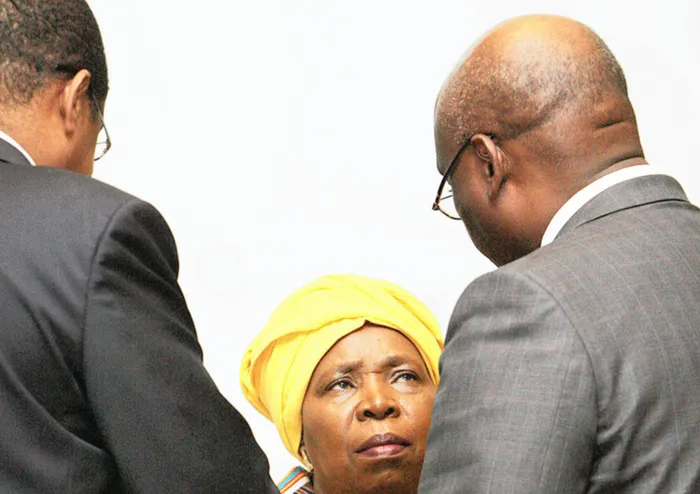
281013 (L) African Development bank chief economist Mthuli Ncube ,AU Chairperson Nkosazana Zuma (centre) Donald Kaberuka African Development Bank President having a chart at the African Economic Conference that took place in Montecasino North of Johannesburg South Africa .photo by Simphiwe Mbokazi 281013 (L) African Development bank chief economist Mthuli Ncube ,AU Chairperson Nkosazana Zuma (centre) Donald Kaberuka African Development Bank President having a chart at the African Economic Conference that took place in Montecasino North of Johannesburg South Africa .photo by Simphiwe Mbokazi
Johannesburg - African leaders must move from talk shops about economic integration on the continent to implementing agreements on integration. This message emerged from several speakers at a conference in Johannesburg yesterday, organised by the African Development Bank (AfDB).
Donald Kaberuka, the president of the AfDB, said every day’s delay in implementing integration agreements added to the costs of remaining 54 fragmented markets.
AU chairwoman Nkosazana Dlamini Zuma said regional economic communities had been making progress but attempts at economic integration on the continent had “not moved as fast as we hoped”. She spoke of overlaps between regional economic communities and said it did not make sense to have a proliferation of such blocs.
She argued that merging a number of small communities into larger ones would be more effective. Among the continental initiatives is the plan launched by President Jacob Zuma in 2011, to create a 26-nation free trade area, from three existing trading blocs: the Southern African Development Community, the Common Market for Eastern and Southern Africa and the East African Community.
Finance Minister Pravin Gordhan said progress was “a lot to do with political will”.
But he argued it was not enough for leaders to reach agreements. He highlighted the role of bureaucrats and technocrats in the process and said it was essential that they were “aligned to the plan”.
He said it was up to senior policymakers to promote integration, create an enabling environment and remove the obstacles.
Discussing Africa’s improved fortunes over the past decade, Kaberuka distinguished between a tipping point and a turning point. “We have come to the turning point; we are not at the tipping point,” he said, despite the continent’s high growth rate in recent years. A tipping point creates an irreversible momentum.
Kaberuka noted that a third of Africa’s countries were growing at 6 percent or more a year and many others at 5 percent. But he cautioned: “There is no way we can maintain this rate of growth until we have solved the infrastructure problem, particularly energy.
“There is no way we can maintain this rate of growth with 54 fragmented markets.”
He said Africa’s problems went beyond the lack of adequate infrastructure.
Presenting a slide showing a congested border post, he said the delays were “not to do with infrastructure”. Pointing to a long queue of vehicles, he said: “The pile-up is due to immigration, security, customs, plant inspectors, a long form to fill in, 10 signatures multiplied by two – and they are stuck at the border post for three days.”
Another weakness, he said, was that many electricity utilities were financially insolvent and supported by “huge subsidies which are not targeted to benefit the poor”. He urged countries to “reform their power sectors and their subsidy systems”.
He also identified congested ports and lack of air routes across the continent as obstacles to integration.
On the future Dlamini-Zuma said: “The heirs to pan-Africanism are not just fighters against what Africa doesn’t like. Today’s generation must be the architects, the builders, the transformers – the key to the African renaissance.” - Business Report
